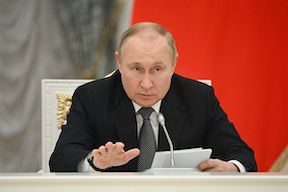Russian President Vladimir Putin said he’s willing to facilitate grain and fertilizer exports as global concern mounts about food shortages and rising prices—but only if sanctions on his country are lifted.
Putin didn’t specify if he was referring to Russian exports or those from Ukraine that have been stopped by Moscow’s blockage of ports since its invasion began in late February. The U.S. and its allies would be highly unlikely to agree to remove the extensive sanctions placed on Russia for its actions in Ukraine in response to the Russian leader’s move to link it to the growing food crisis.

The call focused on a shared solution to the food crisis, Draghi’s office said in a statement that did not mention talk of removing sanctions. A senior diplomat with knowledge of the matter said there would be no quick lifting of penalties on Russia as it persists with a war now in its fourth month.
Russian Deputy Foreign Minister Andrey Rudenko said this week the government in Kyiv is to blame for the halt to grain exports from Ukraine because it mined its ports. Ukraine denies that, says it is Moscow that is preventing ships from docking and accuses it of stealing grain stores from occupied regions.
A White House spokesperson said Russia’s actions were increasing world hunger. Before the war broke out, Ukraine was a key supplier of wheat, corn and sunflower oil to other countries, particularly poorer nations including in north Africa. Grain is now sitting in silos in Ukraine and unable to be shipped.
“Sanctions from the United States and our allies and partners target Putin’s war machine” the spokesperson said. “They do not prevent the export of Ukrainian or Russian agricultural commodities, including food and fertilizer, nor are they preventing the ordinary transactions that are necessary for these exports, such as banking or shipping.”
Nations including Estonia and Lithuania are pushing for a system where grain freighters are escorted through the Black Sea by warships from allied nations in order to get Ukrainian exports flowing again. But that requires mines around the ports to be cleared first, and for Russia to agree to allow the vessels safe passage.
Draghi and Putin discussed Russian steps to ensure shipping from Ukrainian ports, the Kremlin said in its statement. Russia’s defense ministry on Wednesday said it was opening two daily humanitarian maritime corridors from Black Sea and Azov Sea ports.
Ukraine wants guarantees that safe passage wouldn’t allow Russian forces to enter the harbor in Odesa and attack the city, Foreign Minister Dmytro Kuleba said at a press conference in Davos this week.










